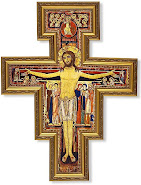Newsweek: How Pope Benedict XVI Will Make History
 Newsweek has released an article on Pope Benedict's upcoming visit to the United States. Here's a selection from the article that reminds us when it comes to understanding Christian Doctrine, Pope Benedict XVI is the master teacher. You can read the full article here.
Newsweek has released an article on Pope Benedict's upcoming visit to the United States. Here's a selection from the article that reminds us when it comes to understanding Christian Doctrine, Pope Benedict XVI is the master teacher. You can read the full article here.
__________________________
The Master Teacher
Modern popes matter in spiritual microcosm as well as historical macrocosm. John Paul II touched, and changed, millions of lives. Go to an American seminary today and ask the seminarians who their priestly role model is. Or visit a parish marriage-preparation course and see how John Paul's "Theology of the Body" is reshaping the Catholic understanding of marriage, sexuality and family life. Graduate schools of theology are filled with students writing dissertations on the thought of John Paul II, whose intellectual impact on Catholicism will reverberate for centuries.
Benedict's personal influence on Catholics is perhaps less dramatic, but it is no less real to those who have seen or heard him personally. Joseph Ratzinger is one of the most learned men in the world; he is also a master teacher who can unpack complex Christian doctrines in an accessible way. That helps explain why he continues to draw enormous crowds to his Wednesday general audiences, some larger than those drawn by his predecessor. The tag line in some Roman circles is that "People came to see John Paul II; they come to hear Benedict XVI." That contrast is too sharply drawn, but Benedict's skills as a teacher have certainly touched a significant 21st-century yearning for solid religious food. His first two encyclicals, on love and hope, were consciously framed to speak to the fears of a deeply conflicted world by reminding the world of Christianities basic message.
Benedict's catechetical skills with children are also striking. Six months after his election, he met thousands of Italian 8- and 9-year-olds who had just made their first communion. One of them asked how Jesus could be present in the consecrated bread and wine of the Eucharist when "I can't see him!"
To which the pope replied, "No, we cannot see him; there are many things we do not see, but they exist and are essential … We do not see an electric current; yet we see that it exists. We can see that this microphone is working, and we see lights. We do not see the very deepest things, those that really sustain life and the world, but we can see and feel their effects … So it is with the Risen Lord: we do not see him with our eyes, but we see that wherever Jesus is, people change, they improve, there is a greater capacity for peace, for reconciliation …"
Another youngster asked why the church urged frequent confession. Benedict answered: "It's very helpful to confess with a certain regularity. It is true: our sins are always the same, but we clean our homes, our rooms, at least once a week, even if the dirt is always the same …
Otherwise the dirt might not be seen, but it builds up. Something similar can be said about the soul, about me: if I never go to confession, my soul is neglected and in the end I'm always pleased with myself and no longer understand that I must work hard to improve …"
What the pope can say so winsomely to children, he will likely say to adults during his American pilgrimage: "Look again at the basics of Catholic faith and practice. They exist for a reason. They just may satisfy the hungers of the human heart. Give them a chance."









2 comments:
Art
Can this article be found online? If so, can you send the link?
Im glad you found the article. I should of posted the link last night. Thanks for bringing that to my attention. Also, these questions and answers that the author is bringing up in this specific exerpt, actually come from Pope Bendict's book 'Questions and Answers.' I remember reading them in the early chapters of his book. .
Post a Comment